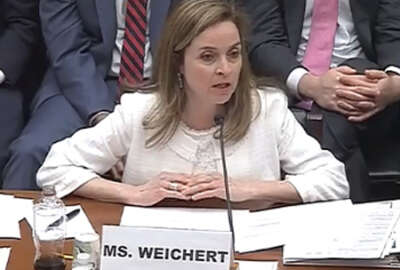
Study shows military pay has been rising faster than civilian pay
In today's Federal Newscast, a new study by the RAND Corporation analyzes how military pay stacks up against civilian pay over the last 20 years.
To listen to the Federal Newscast on your phone or mobile device, subscribe on PodcastOne or Apple Podcasts. The best listening experience on desktop can be found using Chrome, Firefox or Safari.
- A new study found military pay has been steadily gaining ground since 1999. And in at least some cases, it appears to have improved recruitment. Looking at 2016 compensation levels, researchers at the RAND Corporation compared military pay against civilian salaries, and found officer pay is at the 77th percentile. Enlisted members are at the 84th percentile. That’s compared to a 70th percentile benchmark the Defense Department set in 1999. In line with those pay raises, RAND found the quality of recruits has steadily increased in the Navy, Marine Corps and Air Force. They didn’t find that trend in the Army, but said more research would be needed to determine the reason. (RAND Corporation)
- With a handful of recent scandals within U.S. Special Operations Command, Congress ordered the Pentagon to examine the training, professionalism and ethic standards of special operations forces. A report from the Congressional Research Service said DoD will also review how effective existing management is at ensuring compliance in those areas. (Congressional Research Service)
- The Defense Department will consolidate the networks of its fourth estate in hopes of providing a model for the rest of the department. The fourth estate, which refers to the 28 DoD agencies not under the military services’ purview, currently has thirty four networks. DoD would cut it down to just two. (Federal News Network)
- A new fast track method from the Air Force will look to put new technologies in its cloud. The new policy will expedite the cloud security process. Air Force Deputy Chief Information Officer Bill Marion said this new approach will let the service modernize faster and therefore improve cybersecurity. (Federal News Network)
- The Trump administration will focus on fewer, more impactful federal workforce initiatives in 2019. Office of Personnel Management acting Director Margaret Weichert said the administration is still focused on shortening the hiring process, reskilling employees and improving engagement. She said more agencies should get involved and pull their resources together on a few initiatives. Modernizing the federal workforce is one of 14 cross-agency priority goals in the President’s Management Agenda. (Federal News Network)
- The White House received scrutiny from congressional overseers over how it deals with an anti-fraud law. The Government Accountability Office found agencies have challenges with Office of Management and Budget guidance, specifically on how to implement the 2015 Fraud Reduction and Data Analytics Act. Auditors cited missing or skimpy information in Circular A-123, and in guidelines for how to report progress on the law’s requirements. GAO found, an interagency working group is also half-baked. (Government Accountability Office)
- Four out of five of the most common activities federal employees perform have medium to high automation potential. New analysis from Deloitte said agencies have the potential to free up anywhere from 266 million to one billion hours a year of time for federal employees, depending on how much government invests in robotics processing and other automation capabilities. (Federal News Network)
- The IRS detailed a new framework that relies on incremental and modular technology and development to begin to address some of its biggest challenges. An IRS pilot program will aim to simplify the proposal process and accelerate the time it will take for the agency to begin testing emerging technologies. The four-phase approach includes prototyping and initial deployment of software tools. The first area of focus for Pilot IRS is around the scanning of documents. The projects are limited to $7 million over five years. (FedBizOpps)
- The FAR Council is finally catching up on a change to small business contracting from 2013. The council issued a proposed rule to update how prime contractors measure their compliance with subcontracting goals. When the rule is final, prime contractors’ subcontracting goals will be based on the percentage of the overall award amount to be spent by the prime on subcontractors. The Small Business Administration made the change to its policy more than two years ago. Comments on the proposed rule are due by Feb. 4. (Federal Register)
- The Thrift Savings Plan is tweaking the financial hardship withdrawal rules for participants impacted by Hurricanes Florence and Michael. The Federal Retirement Thrift Investment Board is waiving the rule which prohibits participants from making contributions for six months after taking a hardship withdrawal. This change will apply to anyone who lives or works in an area affected by one of this year’s two major hurricanes. (Thrift Savings Plan)
Copyright © 2025 Federal News Network. All rights reserved. This website is not intended for users located within the European Economic Area.
Eric White
Eric White is news anchor and Federal Drive producer at Federal News Network.
Follow @FEDERALNEWSCAST
Related Stories
Related Topics
Acquisition
Agency Oversight
All News
Army
Bill Marion
Coast Guard
Congress
Congress
Congressional Research Service
Contracting
Defense
Defense Department
Defense News
Deloitte
FAR Council
Federal Drive
Federal Newscast
federal pay
fourth estate
Fraud Reduction and Data Analytics Act
Government Accountability Office
IRS
Management
Margaret Weichert
Marine Corps
military pay
Navy
Office of Management and Budget
Pay & Benefits
Pentagon
President's Management Agenda
RAND Corporation
robotics
Small Business Administration
Special Operations Command
Technology
Trump administration
TSP
Workforce





